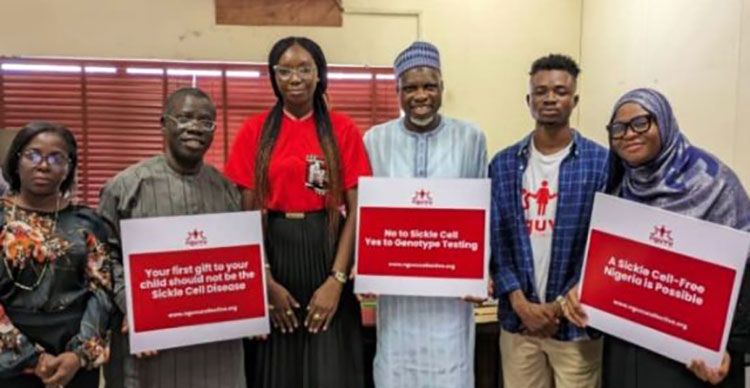
The Nguvu Collective has emphasised the need for a robust national law to ensure access to care for sickle cell warriors, and a commitment to create more awareness around voluntary confidential screening in Nigeria.
The Nguvu Collective is a global women’s leadership organisation based in Kenya, Nigeria, and South Africa. It also supports women from marginalised communities across these countries to become voices for change on the development issues they care about.
Speaking in a meeting, 3 Nguvu Change Leaders Jecinta Egbim, Saratu Kassim, and Bode Afurewaju represented their fellow Change leaders Onor Obassi Tawo and Mariya Bagudo at a meeting with the Federal Ministry of Health’s Non-Communicable Disease Department officials. The meeting, held in Abuja, was attended by Ahmed Mohammed Ozi, Alayo Sopekan, Bunmi Osundele from the Ministry of Health, and Omolara Raji, Partnership Specialist, Nguvu Collective.
They discussed the need for a National Policy on Sickle Cell Disease, which would create a holistic approach towards tackling the disease.
Following the meeting, the Director of Non-Communicable Diseases, Ahmed Mohammed Ozi, said, “Sickle cell is a disease of love.
The experiences it brings can be deeply painful. To reduce the rate of sickle cell disease in Nigeria, universal health coverage is required. And that cannot be achieved without adequate funding for intervention programs.”
The National Coordinator on Sickle Cell Disease, Alayo Sopekan emphasised that “Sickle cell warriors can lead happier and more fulfilling lives with fewer crises with early identification, screening and intervention. We urge more people to use the six sickle centres dedicated to early identification and intervention.
These centres not only provide essential services but are also actively engaged in ongoing research efforts.”
Nguvu Change Leader, Saratu Kassim, said “Government should make screening free in hospitals after childbirth, and out-of-pocket health management costs should be reduced through the National Health Insurance Scheme.” Senior Partnerships Specialist at Nguvu Collective, Ebenezer Wikina expressed, “ It is very encouraging that the Federal Ministry of Health in Abuja has recognised the efforts of Nguvu Changeleaders in raising awareness about sickle cell disease.
Sickle Cell Disorder (SCD) is the most common inherited disorder in tropical Africa. According to the Sickle Cell Foundation, Nigeria contributes around half of the estimated 300,000 newborns with SCD annually.
The two Change Leaders, Onor Obassi Tawo and Mariya Bagudo, supported by the Nguvu Collective, having lost a loved one to this disease, have been tirelessly campaigning for the passage of the Sickle Cell Anaemia in the 10th Assembly.
In a significant development, four states in Nigeria have already enacted laws that include awareness and testing for sickle cell. Our change leaders, who have lost their loved ones to the disease and are survivors themselves, stress the urgent need for Nigeria to have a National policy on sickle cell disease.”
The provision of resources to support sickle cell treatment was also discussed along with the ways stakeholders can collaborate with the Ministry to bring about better health outcomes across Nigeria.
The Change Leaders also shed light on the need for sickle cell public awareness campaigns at the national level in newspapers, across billboards, radio broadcasts and television.
They also shared other health campaigns seeking youth-friendly reproductive health programs within primary healthcare centres, a National Health Insurance Scheme to provide cover for women seeking fertility care and the Primary Healthcare Agency to provide access to mental healthcare.





